Course Information

We look forward to having you on course with us soon! If you have questions about the application process, submitting forms, or anything else, you may contact the Partnership Manager, Megan Sisson: megan.sisson@vobs.org or (218) 491-6790.
Welcome to voyageur Outward bound school!
We are delighted to partner with you.
This webpage is your home base for information about your upcoming partnership program.
Our Mission: To change lives through challenge and discovery
Our Vision: A more resilient and compassionate world... with more resilient and compassionate people
Ready to get started? Use the tabs below to:
-
Read COURSE OVERVIEW
-
SELECT YOUR COURSE
-
Complete mandatory COURSE PAPERWORK and ENROLL
-
Review PACKING LIST
-
Review TRAVEL INFORMATION
-
Review custom program details in GENERAL INFO
VOBS / Galapagos Charter School St. Croix Leadership Expedition
Expedition Dates
Select your date and enroll via "course paperwork" tab
Sign-up early! Expeditions have limited enrollment.
Dates: 7/20/24 to 7/25/24
Welcome Students!
We are excited to welcome you to an adventure like no other. Your Leadership Expedition (wilderness trip), will take place on the St. Croix River, which runs down the border between Minnesota and Wisconsin. If you're coming to us from another part of the US, look up at the top of the map, just under Canada. When people ask where you're going, you can say, "the midwest."
The St. Croix River is a national treasure, and whether you're an expert or a first-timer, it's a beautiful, welcoming and accessible place to paddle a canoe. You won't be far from the cities of Minneapolis and St Paul, but you'll see wild forests, ancient, towering rock walls, peaceful meadows, birds, fish, frogs, turtles and small mammals. Together, with your "crew" of peers, you will paddle and camp to discover belonging, have fun and practice life skills for leadership. No experience necessary!
Your Leadership Expedition is designed to support your strengths and help you discover opportunities for connection and growth. You will travel in a crew of ten peers, with two very experienced, caring and energetic Outward Bound instructors.* You'll learn things about yourself and other people as you experience Outward Bound’s time-tested and proven Leadership Theory of Change (see next section).
See what previous students have said about their experience on a leadership expedition:
Wilderness Leadership Expeditions
Theory of Change:
Learning > Leadership > Responsibility
On Expedition, each participant learns and executes a specific role each day to support safe and successful group wilderness travel and survival, activating peer and personal leadership through trust and vulnerability. Participants develop character and community together-- more resilient and compassionate people, for a more resilient and compassionate world.
The Leadership Expedition develops key social-emotional skills across four Domains of Thriving, leading to vital character outcomes for success. Outward Bound promotes belonging, strength and purpose for developing leaders through hands-on intra and inter-personal skill development.
Domains of Thriving:
Belonging, Courage, Physical Engagement, Reflection
Character Outcomes:
- Teamwork
- Self-Awareness
- Social Responsibility
- Assertiveness
- Perseverance
- Physical Confidence
- Self-Regulation
- Group Relationships
St. Croix River National Wild and Scenic Riverway, Minnesota and Wisconsin
The St. Croix River system was one of the initial 8 rivers to be designated as a National Wild and Scenic River in 1968. With 200-miles of canoe routes lined by an ever changing landscape of dense forest, towering rock walls and oak savannah, the St. Croix River provides a wonderful introduction to paddling.
Multiple different rivers, including the St. Croix River’s largest tributary, the Namekagon River in Wisconsin, converge to eventually become the border between Wisconsin and Minnesota. This section of protected river concludes near Minnesota’s Interstate State Park. Interstate State Park contains some of the most outstanding and unique geological features to be found anywhere in the world, including 10 different lava flows that allow for excellent rock climbing.
Canoeing St Croix – Each section of the St. Croix River is a beautiful introductory experience to canoeing. Students travel in two-person canoes and learn to maneuver through Class I or II rapids. Students learn to steer their canoes with confidence by using the “J,” “Pry,” and “Sweep” strokes while communicating with their paddling partners. After learning daily travel routines and canoe strokes, students continue to develop their skills by learning how to recognize river current, anticipate obstacles, scout rapids, and work as an effective team to negotiate more challenging sections of the river.
In addition to paddling, students gain a basic understanding of river and forest ecology, river hydrology, swimming in moving water, fire building, camp craft, and expeditionary travel. Each night, the group will make camp, pitch tents, and cook over an open fire while debriefing their day.
Solo – Weather and time permitting, an Outward Bound Solo experience provides an important break from the rigors of the expedition and gives students the opportunity to reflect on their Outward Bound experience. The duration of Solo depends on the course length and type as well as the competency and preparedness of the student group. Students on a 1-2 week course typically spend 2 hours to half-a-day on Solo. All students receive sufficient food, water, and shelter to keep them safe and healthy during Solo. Instructors choose Solo sites to offer as much solitude as possible while retaining some proximity to the whole group. While students spend the majority of their Solo time alone, Instructors do check on each student as often as needed, usually 1-2 times, to ensure that each student feels safe and comfortable. Instructors work with each student individually to structure a successful, unique Solo experience that meets their specific needs. Solo is purposefully scheduled near the end of the expedition so students have plenty of time to acclimate to their new environments beforehand.
Students often have mixed feelings leading up to Solo. Inevitably, students feel some nervousness and hesitation but are also excited to rest, reflect and test their new skills after spending many days in the wilderness. Students often find that Solo provokes profound and powerful learning in a short period of time and Solo often becomes one of the most memorable parts of their Outward Bound experience.
The following is an example of what your course itinerary may look like. Your actual itinerary will vary according to weather, student skills and abilities, and instructor preferences.
Day 1: Your adventure begins! Meet your Outward Bound Instructors, organize your equipment, eat dinner and sleep outside on the very first night of the course on the St. Croix River.
Day 2: Wake, have breakfast, pack, and participate in a paddling clinic on the water. Travel until it’s time to set-up camp. Learn to set-up camp and cook over a fire. Eat and participate in an evening activity before heading to your tent for the night.
Days 3-5: Continue paddling to your next campsite, as you refine your wilderness skills. Participate in the solo experience. You'll also get to paddle some Class I and II rapids!
Day 6: Continue on your Final Expedition, participate in a graduation ceremony, clean and de-issue gear, and depart home.
Minnesota’s weather can be unpredictable with a wide range of temperatures. In the summer the temperature tends to stay between 60 and 85 degrees. Summer brings occasional thunderstorms and rain showers. Expect cooler evenings, misty mornings, occasional rainstorms, and hot days perfect for swimming.
Please utilize the resource below to physically and mentally prepare for your course. The more preparation you do, the better your experience will be!
Camp & Shelter Setup for Spring, Summer, and Fall Courses:
Campsites in the Boundary Waters Canoe Area Wilderness, the St. Croix River, and on the Superior Hiking Trail contain tent sites, fire grates, and pit toilets. After arriving at your campsite in the evening, you'll care for your feet, gather lots of firewood, and set up tents for sleeping in and tarps for sheltering gear and yourselves in inclement weather. You'll cook your food over an open fire and gather for evening meetings. On St. Croix courses you may cook over a camp stove instead of a fire. 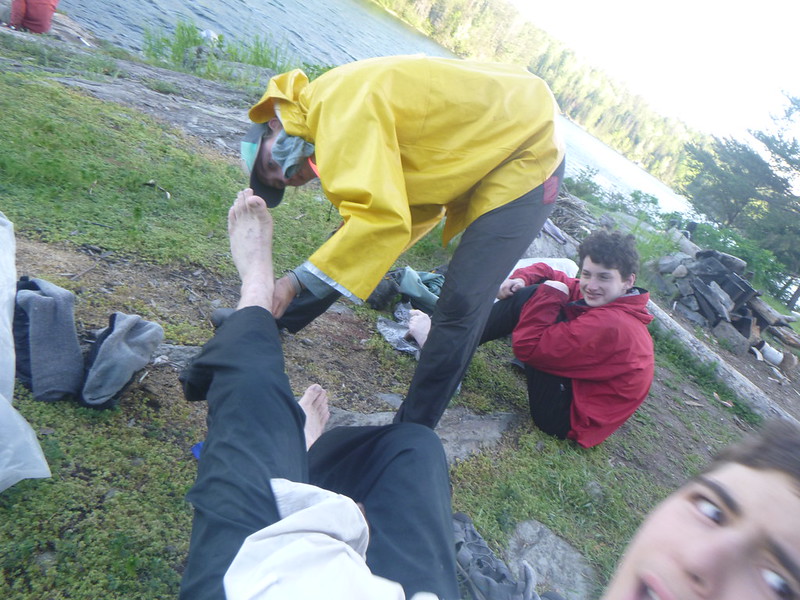
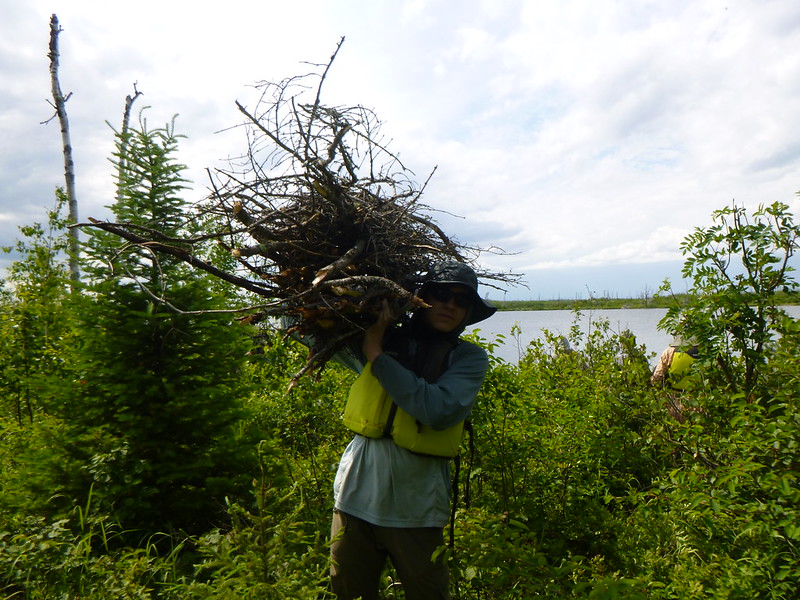
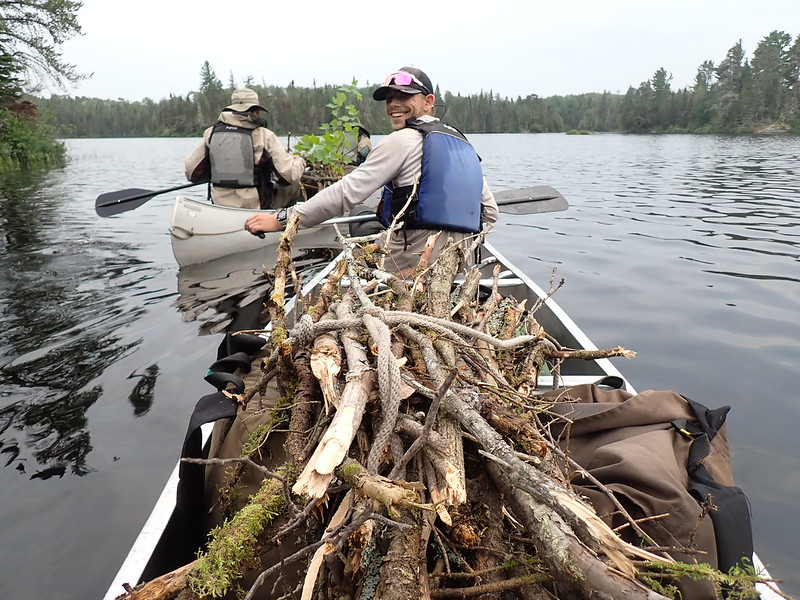
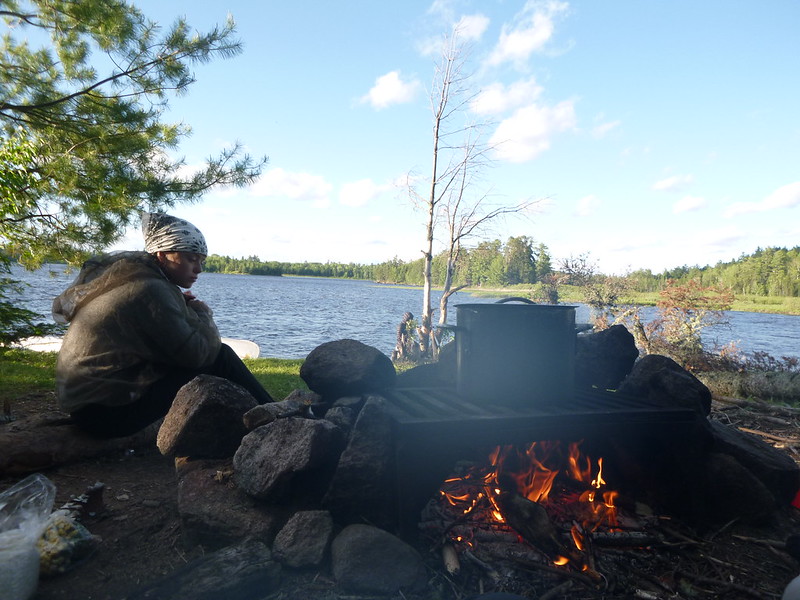
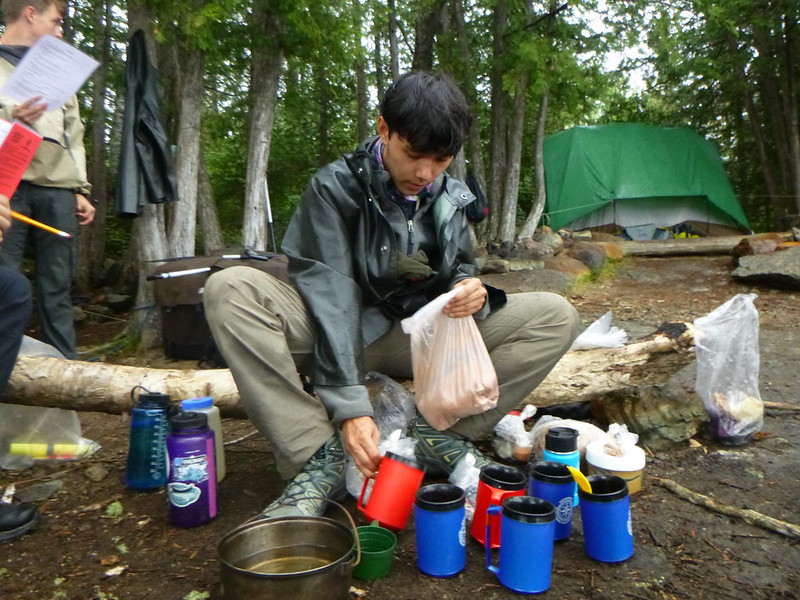
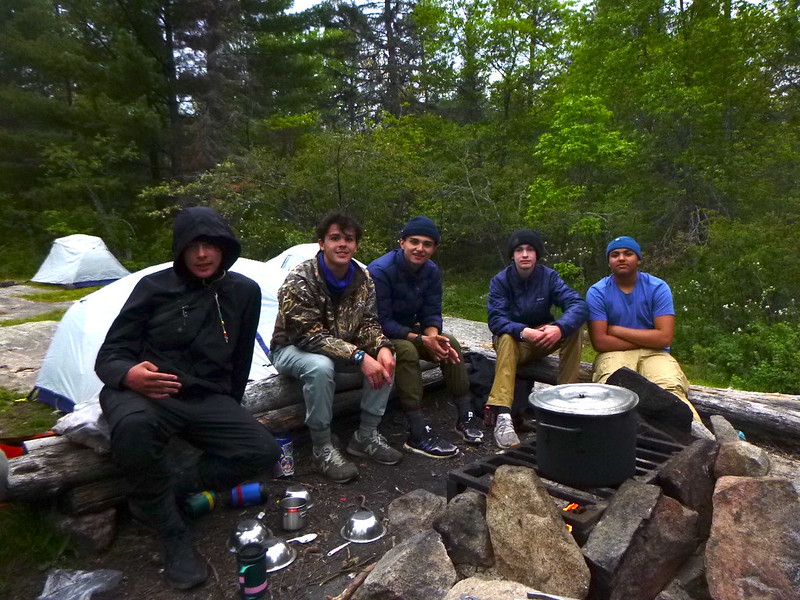
Preparing and eating tasty meals in the backcountry is part of the Outward Bound experience.
Under your instructors' supervision, you and your crew will prepare group meals in a camp setting over an open fire on a US Forest Service firegrate. Meals are eaten as a group and may start off with group announcements, appreciations, or an inspirational quote. We use this time together to reflect on the successes and challenges of the day and to plan what is to come for the following day.
Your group will travel with all the food you need for your expedition. For some longer courses, our support staff meet up with your group in the wilderness to restock your food. This meet up is called a “re-supply.”
Our courses are physically rigorous, and our meals emphasize protein and carbohydrates to re-fuel your body. All course food is packable and non-perishable. We use a mix of dehydrated foods, fresh fruits, and vegetables. Our goal is to provide meals that are familiar. However, we ask that you be open to trying foods that may be new to you.
Participants should not bring their own food or snacks unless authorized to do so by your Course Advisor.
Our Food Pack Out Process
All meals at Outward Bound are cooked outdoors in remote camp settings. We work diligently to provide familiar and tasty foods, and we acknowledge that our food options are limited while we are on expedition, away from our supply facilities.
We depend on clear and accurate food allergy and dietary restrictions disclosed during the admission process to adequately plan and pack your group’s meals and snacks before your course start. Our processes are not designed to accommodate last minute dietary requests or to loosen dietary restrictions originally disclosed.
Dietary Restriction Options
- We can accommodate vegetarian, vegan, gluten-free, soy-free, nut-free, and various other dietary restrictions
- Soy Milk (Oat milk for those with soy allergies)
- Sunflower butter and nut-free trail mix for those with nut allergies
- Beans and hummus for vegetarians and dairy-free/vegan options
- Gluten-free noodles and oats (all our granola is gluten-free)
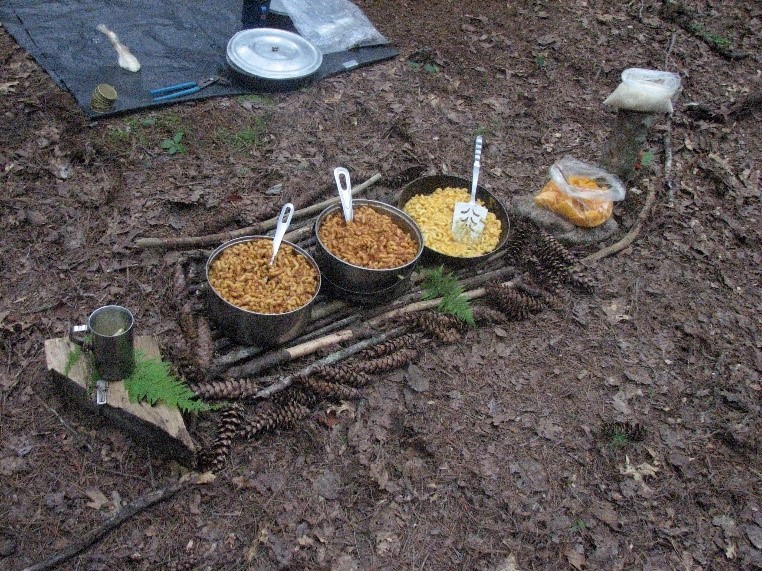
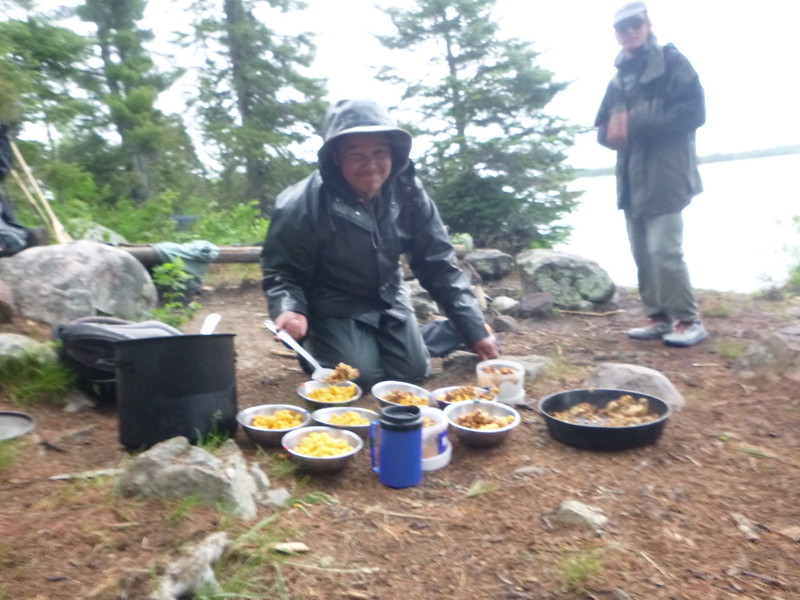
MEALS AT OUTWARD BOUND
The following list represents common meals at Voyageur Outward Bound (this is not a menu)
Breakfasts
- Granola (locally made in Ely, MN) with milk (powder)
- Oatmeal with fixins’ (raisins, pumpkin seeds, cinnamon, sugar)
- Cheesy Grits
- Grape Nuts cereal with Milk (optional: add honey or vanilla pudding powder)
Lunch
- Bagels and cream cheese
- Pepperoni or Summer Sausage with cheese on tortillas
- PB&J Tortillas
- Hummus & Tuna & Crackers
- Bean and Cheese Burrito
- Extras: Trail mix (GORP)/ Dried Fruit
Dinner
- Refried Beans and Rice with peppers and fresh salsa
- Spaghetti: Noodles with tomato sauce and veggies
- Pesto Pasta
- Peanut Noodle Stir Fry
- Voyageur Stew: lentils, rice, potatoes, carrots, and cabbage with a side of biscuits
- Chili and Cornbread
- Macaroni and Cheese
- Chili Mac
- Curry with potatoes, lentils, and carrots
Snacks & Extras
- Apples
- Dried Fruits
- Trail Mixes
- Flappers (homemade “granola bars”)
- Chocolate Cake
- Brownies
- Cornbread
- Biscuits
- Bread
Drinks
- Tea (both bags and house-made chai mix)
- Cocoa
- Coffee
- Drink Mixes (Lemon-Lime and Orange)
Click on this link to enroll on this course. You will be asked for basic contact and medical history information. This initial registration takes 20-30 minutes, and can be paused at any time to continue later. Once you submit this registration, your course advisor will email you with more course information, and any follow- up paperwork you might need. Registration is due 2 months prior to the course start day.
Please also read and review our Essential Eligibility Criteria and our Behavior Guidelines & Cause for Dismissal
Essential Eligibility Criteria
Behavior Guidelines & Cause for Dismissal
Wilderness travel means you can and, for your comfort, should carry a lot less than you do in the regular world. Most experienced wilderness travelers will tell you that they bring about the same amount of gear on a three-day trip as they would on a three-week trip. This packing list has been refined over 50 years of Voyageur Outward Bound School expeditions. Please stick to it closely. It is designed to ensure that you have everything you need to be safe and comfortable during your expedition.
We recognize that many of these items are things you may not already own. If you'd like to purchase them for your course, feel free. If not, we have you covered! Fill out the Gear Loan Request Form below, and we can provide all those items for you free of charge. If you have any questions about the packing list, email your course advisor any time..
Because our courses are characterized by unpredictable weather, obtaining the proper clothing is crucial. Please bring all the items as described on the "Required Clothing and Gear" list below. We have shared links for some items to show you examples. You also find required clothing & gear items at camping, outdoor/ farm stores, Army/Navy surplus, and thrift stores. Clothing and gear can be expensive—shop around before you buy and keep these helpful tips in mind:
- Start at the thrift store.
- Buy last year’s model.
- Don’t worry about colors or style.
Your choices should be governed by whether or not the piece of clothing or gear will meet our requirements, not if it is the best looking or newest! Consider leaving the tags on any new items you have purchased and saving the receipts; in the event that an item is not needed for your expedition or you do not use it, you should be able to return it when you get back home.
NOTE: When you arrive for course start, you will not have an opportunity to purchase forgotten items.
If you are looking to shop online, many students use the following websites to find their clothing and gear:
On the first night of the course, your instructors will issue you the equipment provided by Outward Bound and assess all of the clothing/equipment you’ve brought in order to ensure that it meets the requirements of the expedition. You’ll repack exactly what you need into packs provided by Outward Bound. Everything you don’t need during the expedition, including your shower supplies, clean clothes for the trip home, valuables, and electronics will stay in your luggage and be stored in a secure location for the duration of the course. These items will be returned to you at the end of the trip.
Outward Bound will provide you with these items:
- Sleeping bag
- Sleeping mat
- Backpack
- Rain gear
- All group camping, cooking, and traveling equipment
You only need to bring what’s on the Required Clothing and Gear list, mainly your personal clothing, toiletries, footwear, and a few additional items. We strongly discourage the use of personal camping equipment on Voyageur Outward Bound School courses because of the heavy wear and tear. We feel confident that the equipment we provide will best serve your needs on the expedition; it will keep you safe, warm and dry. If you have questions about using a piece of personal equipment normally provided by Outward Bound, please contact your course advisor to discuss. If you do decide to bring a piece of personal equipment, your instructors reserve the right to inspect it and ensure that it will adequately serve your needs during the expedition. If they do not think it will work, you can leave it with your luggage at the basecamp during the expedition.
Our packing list is based on layering principles; dressing in several light layers rather than one heavy layer allows you more flexibility as the weather and your exertion levels change. When shopping or packing, it is a good idea to try on all of your layers at once to ensure that they fit over one another. Read the information below to get a better idea of what we’re talking about.
- Inner Layer: This is usually called the wicking layer (long underwear, liner socks, and sometimes gloves) – Moisture is the enemy of warmth. Sweat from physical activity like backpacking, paddling, or climbing is your body’s attempt to cool itself off. Synthetic long underwear pulls moisture away from your body, so your sweat won’t cool you down too much and make you cold. This layer is worn next to your skin. Cotton items retain moisture and exaggerate sweat’s cooling effect, which is why we’ll sometimes ask you to avoid using cotton clothing.
- Middle Layer: This is usually called the insulation layer (fleece tops, wool socks, and sometimes fleece pants) – This layer should be thick and fluffy like a fleece or wool sweater that will trap and store the heat your body is producing. This layer is worn over the top of the base layer. Your packing list might require more than one “insulating layer” like a medium weight fleece and a heavier wool sweater. You can put on several "insulating layer" pieces at a time, so be sure to try them on over the top of your inner layer and over the top of each other to ensure you still have mobility and things aren't too tight.
- Outer Layer: This is usually called the wind/shell layer (jackets, pants, and rain gear) – Adding an outer windproof layer prevents the wind from stealing your store of built-up heat. The third layer is worn on top of the base and insulation layers. This layer will take the most wear and tear and look the most weather-beaten by the end of the trip. For dogsledding courses, we provide all outer layers for you. For all other courses, rain gear is provided.
Click the button below to view and download the packing list. Page 1 are items you need to bring. Page 2 are items you can bring if you have them already, but you can also request to borrow them using the Gear Loan Request Form in the QR code below the list, or in the next Section of the webpage.
If you need to borrow any gear from the Required Clothing and Gear list, Outward Bound would be happy to loan it to you. Please complete this simple online form to let us know what you need, and we will have it waiting for you when you arrive.
Participants will not be permitted to begin their course without their required medications OR with new medications not approved by your Course Advisor.
All medications (prescription, non-prescription and over-the-counter) must:
- Be listed in the applicant’s medical information
- Be approved by your Course Advisor prior to course
- Accompany the participant on course
- Be in the original medication container with the prescription label intact
Your medication container should not include other medications, vitamins or supplements. If possible, bring a back-up supply.
Do not bring non-prescription medications such as aspirin, Advil, etc., unless they are listed in your medical information. We have a medical kit that contains these medications.
Medication updates that occur after applicants are cleared to participate could affect their status on course. Please update your Course Advisor with any medication changes such as:
- Starting a new medication
- Stopping an existing medication
- Dosage change of an existing medication
For participants on youth courses, our instructors carry all prescription medications, with the exception of birth control and emergency medications such as EpiPens or rescue asthma inhalers.
For participants on adult (age 18+) courses, we encourage participants to store their medication(s) container(s) in a zip-lock bag for protection. Pill sorters are not recommended.
You must notify Outward Bound should any medical, psychological, behavioral, or legal situations occur after the application and medical review process have been completed. Certain situations may affect the applicant’s course status.
Increased physical activity during Outward Bound may cause a change in your menstrual cycle. Prepare your menstruation kit using a zip lock bag even if you don’t expect your cycle during course.
Items to include:
- Menstruation products such as tampons, pads, panty liners, and menstrual cups. Bring more than you would typically use. Absorption underwear is not recommended. For a water-based course, we recommend avoiding pads for day-use if possible.
- 1 small travel pack of septic-friendly disposable wipes or bandana. Our instructors will teach appropriate backcountry techniques for basic cleanliness.
- 1 small travel-size bottle of hand sanitizer
- 1 to 2 extra pairs of underwear
We practice Leave No Trace camping techniques. Therefore, we pack out what we pack in. Instructors will distribute small opaque zip lock bags and small stuff sack for your individual storage of used items.You will dispose of any used items either during re-supplies (approximately every three to seven days) or at course end.
Your instructors are experienced in addressing menstruation care questions or concerns while on course. Don’t hesitate to ask them questions.
PERSONAL HYGIENE:
Maintaining personal hygiene in the wilderness is important and is taught on every course. You will be outside while on course and won't have access to a shower or bath. You will be able to do basic cleanup every day: brush your teeth, wash your face, and comb your hair. At the end of your course, you will be able to do a more thorough cleanup.
PRESCRIPTION EYEWEAR: GLASSES & CONTACTS
Please bring your prescription eyewear and any applicable backup options. For glasses, a glasses leash is helpful to prevent loss during an activity.
For participants who wear contact lenses, you must bring your prescription glasses as backup. Be sure to bring enough contact lens solution so you can be diligent in your contact lens routine while out on expedition.
Please be aware that the use of contact lenses in the backcountry does carry more risk than when at home. A great level of diligence and hygiene is required to ensure you do not damage your eyes.
SKIN CARE
You will be outside during your course. To maintain your health and comfort, the best protection from biting insects, skin irritation, and sunburn is a physical barrier of clothing. Bring the required clothing and gear listed – it's essential to your comfort and safety.
Living outside and exposing your skin to the elements can lead to dry skin. If you have a cream you use to care for dry skin or other related skin-health, consider bringing any creams or prescription creams you've found useful. Be sure to ask your course advisor any questions you might have.
It is your responsibility to follow your instructor’s directions and monitor how your skin reacts to the changing environment. Let them know if you encounter skin concerns before they present a barrier to your participation.
As you pack your toiletries, if you're traveling by air to your course, please review the TSA Carry-on Requirements for liquids.
HAIR CARE
Here are a few tips caring for long, kinky, or curly hair while on course:
- Bring a comb, brush, or pick
- Protect your hair by covering it with a hair bonnet, silk scarf, headwrap, durag, loc tube, bandana, etc.
- Use a bandana, head wrap, hair scrunchies, etc., to keep hair out of your face
- Bring 3oz hair oil
Before course, consider putting your hair in a protective style, allowing enough time for your head to adjust prior to the start of your Outward Bound course. Be sure that your protective style will fit underneath a helmet. Suggested protective styles include:
- Box Braids
- French Braids
- Feed-in Braids
- Cornrows
- Faux Locs
- Two Strand Twists
- Plaits
- Flat Twists
Canoeing River Shoe
Camp Shoes
Your Camp Shoes are worn each evening and morning at your campsite. They get packed away in a safe spot while you travel so they remain dry. Camp shoes should be lightweight, sturdy running shoes, not sandals. Full coverage shoes are required while you’re cooking and working around the campfire to protect your feet from hot embers and boiling cooking-water.
Some Voyageur Outward Bound School courses finish with a Challenge Event that often involves a running component, and some groups do morning runs or day hikes. You can use your camp shoes for these events. For this reason, you’ll need sturdy running shoes NOT fashion or skateboarding type sneakers.
None of these items are required and you will be fine without them. Please only buy them if you plan to use them again after your course or you think they will be of great assistance to you during the course. You may be asked to leave these items behind depending on pack-size and weight restrictions.
- 1 Bug Shirt. While this item is optional, we HIGHLY recommend it for any courses between June and August. Visit www.bugshirt.com to see exactly what we recommend. Do not bring the all mesh variety because they get ripped.)
- 1 Hair Bonnet. If you use a bonnet at home, feel free to bring it on course! It is a great way to protect your hair at night.
- Permethrin - Must treat at least 2-3 days before course-start. Again, this is optional, but the Voyageur Outward Bound School HIGHLY recommends that you treat your clothing* with Permethrin, which repels ticks and mosquitoes. Lyme Disease continues to spread and cases have recently been reported in northern Minnesota. Your Instructors will teach you how to minimize your risk of tick-bites. Treating your clothing with Permethrin will further lessen your risk. *DO NOT treat base layers (long underwear tops and bottoms for example), or any item that will cover your face (buffs, masks, etc).
- Camera. Waterproof disposables (bring a few) are great and you don’t have to worry about protecting them from the elements. A small regular camera would also work well, but you’ll need to take extra precautions to protect it. Ziploc bags work, or consider getting a waterproof case. For digital cameras, we ask that the memory card(s) be blank; please back up your photos and erase your memory cards prior to arriving for course.
- Ear Plugs. If you are a light sleeper, earplugs can be very helpful.
- One-gallon Freezer Ziploc bags: used to waterproof smaller personal items such as camera, journal, and headlamp.
i-pods, MP3 players, computers, i-pads, and GPS devices?
Cell phones, tablets, GPS devices and all other electronic devices (exception-digital cameras) are not permitted on course. Electronic devices can be distracting and disruptive to the wilderness experience. Stepping away from these devices encourages participants to focus on their experience and their crewmates.
You are, however, more than welcome to travel to and from your course with whatever technology you choose. When you arrive, we’ll have you turn off all electronic devices and leave them in your luggage. Your luggage will then be locked in a secure area during your course. At the end of your course, you’ll get everything back. Additionally, please do not bring any emergency response technology. Your instructors will carry emergency communication devices.
cameras?
Cameras are welcomed at Voyageur Outward Bound School. We recommended waterproof disposable cameras. If you elect to bring a non-disposable camera, we advise that you store it in a small “dry bag” or plastic zip-lock bag. Our courses are rigorous and there is a risk of losing or damaging your camera.
For digital cameras, we ask that the memory card(s) be blank; please back up your photos and erase your memory cards prior to arriving for course. Cell phone cameras, tablets, and any other Wi-Fi enabled electronic devices with built-in cameras are not permitted on the course.
my cell phone and use it as a camera?
No, if you’d like to take pictures, please bring a camera that does not have cellular capabilities. No cell-phones will be allowed on the expedition.
a book?
Unless it’s a natural history identification book, we’d ask you to leave books at home. You’ll be very busy during your expedition and will want to spend your downtime with other group members, sleeping, and just relaxing in nature. Books also get damaged easily. You can bring a book for your travel days but don’t plan to bring it on the expedition.
a pocket knife?
Please do not bring any knives with you to your course-start. Your instructors will provide knives as they are needed throughout the expedition.
my own camping gear (sleeping bag, tent, etc.)?
We strongly discourage the use of personal camping equipment on Voyageur Outward Bound School courses because of the heavy wear and tear. We feel confident that the equipment we provide will best serve your needs on the expedition; it will keep you safe, warm and dry. If you have questions about using a piece of personal equipment normally provided by Outward Bound, please contact your course advisor to discuss. If you do decide to bring a piece of personal equipment, your instructors reserve the right to inspect it and ensure that it will adequately serve your needs during the expedition. If they do not think it will work, you can leave it with your luggage at the basecamp during the expedition.
fishing gear?
Every day you will be traveling from campsite to campsite working your way back to the Voyageur Outward Bound School basecamp or your pick-up location. You’ll be very busy with the daily chores of traveling and living in a wilderness setting and there may not be time for fishing. For this reason, fishing is not a typical activity on most Voyageur Outward Bound School courses. However, if you are very interested in fishing, an exception is sometimes (not always) possible. In these cases, you will need to ensure that you have the correct permit/license, bring one small collapsible pole and one small (paperback book size) fishing tackle box. Outward Bound will provide a fillet knife. Call your course adviser if you are interested in fishing during your course, but please understand that it may not work-out due to other course goals and logistics.
over the counter medications?
Voyageur Outward Bound School Instructors carry an extensive First-Aid kit with ample supply of over-the-counter medications like pain relievers and antacids, among other supplies. Instructors also carry prescription epinephrine injections in case of an anaphylactic emergency. You shouldn’t need to bring your own OTC medication. However, if you frequently take something specific, please consult your course advisor to discuss whether you should bring it or not.
tobacco, drugs, or alcohol?
Tobacco, drugs, and alcohol are NOT permitted on course, this includes both time spent in the wilderness and at basecamp.
Please also DO NOT bring valuables, jewelry, makeup, candy, gum, or large amounts of money.
Specific travel information will be added for your group as the course gets closer.
DOCUMENTATION FOR FLIGHTS - Passports remain one of the accepted documents for identification while flying. Other accepted documents include (See more information here about acceptable documentation):
- Driver's licenses or other state photo identity cards issued by Department of Motor Vehicles (or equivalent)
- Beginning May 7, 2025, if you plan to use your state-issued ID or license to fly within the U.S., make sure it is REAL ID compliant. If you are not sure if your ID complies with REAL ID, check with your state department of motor vehicles.
- State-Issued Drivers License or State-Issued ID
- U.S. passport or U.S. passport card
- DHS trusted traveler cards (Global Entry, NEXUS, SENTRI, FAST)
- U.S. Department of Defense ID, including IDs issued to dependents
- Permanent resident card
- Border crossing card
- An acceptable photo ID issued by a federally recognized Tribal Nation/Indian Tribe, including Enhanced Tribal Cards (ETCs).
- HSPD-12 PIV card
- Foreign government-issued passport
- Canadian provincial driver's license or Indian and Northern Affairs Canada card
- Transportation worker identification credential
- U.S. Citizenship and Immigration Services Employment Authorization Card (I-766)
- U.S. Merchant Mariner Credential
- Veteran Health Identification Card (VHIC)
If you hold a driver's license and do not have a passport, please continue reading.Starting May 7, 2025, all U.S. travelers must have a REAL ID-compliant license or another accepted form of identification, such as a passport, to fly domestically.If your child doesn't have a passport, you'll want to begin that process now. Check your state’s DMV website for more information or to book an appointment and stay ahead of the deadline, as DMV appointments are in high demand.
What is REAL ID? It is a federally mandated security standard for state-issued IDs that sets minimum security requirements to improve the reliability of identification for air travel and other federal purposes.Helpful Resources: REAL ID FAQs for everything you need to know
MEALS AND MONEY ON ARRIVAL/DEPARTURE DAYS - Please bring a little cash for meals during your travel days. Outward Bound will provide dinner on the first day, breakfast on the last day, and some snacks on both of these days. There are minimal food options once you exit the security gate at the airport so plan to get something before you arrive or before you exit security. Remember to drink plenty of water throughout travel days!
MEDICATIONS – If you take a prescription medication, please ensure that you have enough to complete the entire course, and bring a back-up set if possible. If you use an inhaler or carry an Epi-pen, please bring 2 sets.
Remember to pack your medications and other important items (contacts, glasses, travel documents, money) in your carry-on luggage in case your checked bag is delayed or lost.
CLOTHING/DRESS ON ARRIVAL DAY – Please arrive at the meeting place already dressed in your expedition clothes. Your boots or tennis shoes, wool socks, quick-dry pants, underwear, t-shirt and warmer long-sleeved layer (accessible) work best on the first day. Please see the provided packing list for further information about appropriate luggage, clothing and layering principles.
If a student’s family experiences an emergency and needs to inform the student while the program is running, the family should contact the On-Call number at 651-728-1143. Please know that communication with our staff and students in the field is not instantaneous. It may take several hours up to an entire day to establish two-way contact.
Please follow this link to read VOBS' Essential Eligibility Criteria.
VOBS regularly evaluates its programming. Students may be asked to complete 1-2 surveys at the end of their course to assist us in this evaluation. These surveys may include:
1. We ask all participants to complete an anonymous survey at the end of programming. Participants are asked to answer the survey items and to indicate their race/ethnicity, gender, and birth year. Completing the survey is optional. No identifying information is included as part of the survey or in any reporting. We also ask participants to provide a reflection of their course and other feedback. This information is used by the organization for reporting on program outcomes and for program improvement purposes.
2. Outward Bound is partnering with The PEAR Institute (Partnerships in Education and Resilience) on a research project to promote our students’ positive social-emotional development. As part of this effort, Outward Bound staff may invite you/your child to complete a brief survey at the end of your/their Outward Bound course. The survey includes PEAR’s Holistic Student Assessment (HSA) plus several additional questions about the student’s social-emotional development and experience while on the course. You/your child’s responses will be kept confidential, results will be reported as a group, and names will never be used in any reports related to this research. Data from this survey will be used for research and educational work and only designated Outward Bound staff and Outward Bound’s research partners will have access to the results.
For more information, including the opportunity to opt-out of the survey, click on the following link/s to download the English Language, English-Spanish Language, or English-CapeVerdeCreole Language versions of the consent form opt-out and return a signed copy to your Course Advisor.
Tick-borne disease is a risk in the areas where VOBS runs the majority of their courses. Fortunately, there are prevention steps that are very effective, and in the case of infection, treatment is relatively simple and recovery complete, so long as the diagnosis is made early. Students and their families should educate themselves on the risks, prevention measures, and signs and symptoms of tick-borne diseases by reading the information provided below.
Risks
Lyme disease is the most common tick-borne disease, but is not the only risk. Some of the other common tick-borne diseases reported include Babesiosis, Ehrlichiosis, Powassan (POW) virus, Rocky Mountain Spotted Fever, Tularemia, and Anaplasmosis. There are treatments available for these diseases, but prevention is by far the best and first step!
*Lyme Disease Incidence Rates by State 2010- 2019 http://www.cdc.gov/lyme/stats/chartstables/incidencebystate.html
Prevention
- Staff will teach students to recognize ticks and remove them as soon as they are found. This is the BEST form of disease prevention. Removing ticks within 24 hours considerably reduces the risk of being infected with a disease-causing bacterium.
- When traveling or camping in areas with woods, bushes, high grass, or leaf litter, staff and students will check themselves for ticks at least once every day.
- Wear and use protective clothing/equipment (long pants tucked into socks, for instance). Light colors make it easier to see ticks.
- Use a chemical barrier. Some Outdoor clothing comes pre-treated with Permethrin, such as BugBeWear, Insect Shield, L.L. Bean’s No Fly Zone, and ExOfficio’s BugsAway. You can also treat any clothing and footwear (long-sleeve shirts, jackets, hats, gaiters, and boots) with Permethrin to repel and disable ticks. Two methods for treating your own clothing are to send clothing away to Insect Shield or to treat it yourself at home with a spray-on Permethrin solution available from Sawyer or Repel. This treatment will last up to a month. Follow instructions on the bottle for how to apply permethrin to clothing items. Clothing must be treated prior to traveling to course start. DO NOT treat base layers (long underwear tops and bottoms for example), or any item that will cover your face (buffs, masks, etc).
- Use a chemical repellent. Apply insect repellent containing about 30% DEET to exposed skin, according to the directions on the container. This lasts for a few hours before you have to reapply it.
You should include this with your child if it is on the course packing list. Insect repellent containing DEET will also be supplied on all courses where there is a significant chance of vector-borne illness transmission.
Signs and Symptoms
There are many symptoms associated with tick-borne diseases. Infected people may not have all of these symptoms and many of these symptoms can occur with other diseases as well. Some common symptoms of infection with tick-borne diseases include body/muscle aches, fever, headaches, fatigue, joint pain, rash, stiff neck, and facial paralysis. Seek medical attention if signs and symptoms of a tick-borne illness appear. Tick-borne diseases are diagnosed based on symptoms and the possibility that the person has been exposed to infected ticks. Most cases can be successfully treated with specific types of antibiotics.
Additional information
There are other vectors in addition to ticks that inhabit the areas VOBS travels in, mainly mosquitos. Some vectors may be capable of transmitting West Nile Virus, LaCrosse Encephalitis, Jamestown Canyon Virus, Lyme’s disease, Anaplasmosis, Babesiosis, Rocky Mountain Spotted Fever, Ehrlichiosis, Powassan Virus, Tularemia, and Swimmer’s Itch.
Additional information on vectors, vector-borne diseases, and their prevention can be found on the CDC, WHO, Minnesota, Wisconsin, and Texas state department of health websites.
Safety is our number one priority. At all levels of our school, we demonstrate our dedication to participant safety by our words, actions and values. Outward Bound has been a national leader in wilderness safety for over 50 years and frequently advises and assists other organizations in outdoor adventure risk management. Living and traveling in a remote wilderness setting exposes you to risks different than those you may encounter in your daily life. We believe that accepting appropriate risks and training and preparing participants to manage those risks, provides invaluable life experience.
Regardless of precautionary measures, risk and uncertainty are central to the concept of challenge and adventure. The intent is not to avoid activities involving risk but to recognize, prepare for and successfully manage risk. In order to identify any potential hazards and update best practices, our programs are regularly reviewed by outdoor professionals from inside and outside the Outward Bound system.
Outward Bound instructors receive regular training in the activities and environments in which we deliver our courses. They are trained to anticipate and manage risks inherent in remote areas. They are also trained in first aid, search and rescue and emergency management. Our instructors are certified Wilderness First Responders; some are Wilderness Emergency Medical Technicians or equivalent. Outward Bound maintains a minimum staff-to-student ratio of approximately 1:6. Instructors work in teams of two or three with six to 12 students. Instructor teams are usually co-ed but balancing skills and teaching styles is our primary staffing focus. One instructor in every team is a lead instructor with multiple seasons of training and experience. The lead instructor has single point accountability for the safety and effectiveness of the course in the field as well as mentoring their staffing team.
For more information on our instructors, please check out our staff profiles page or our careers page for instructor requirements. As a participant, you must take responsibility for yourself by following instructions and practicing the skills taught by your instructors.

Sign Up for Updates
Please fill out the form below to begin receiving our email newsletter.

- +1 (218) 491-6801
-
Admissions
+ 1 (828) 239 2376 - Email us - student.services@vobs.org
-
1650 Carroll Ave.
St. Paul, MN 55104

